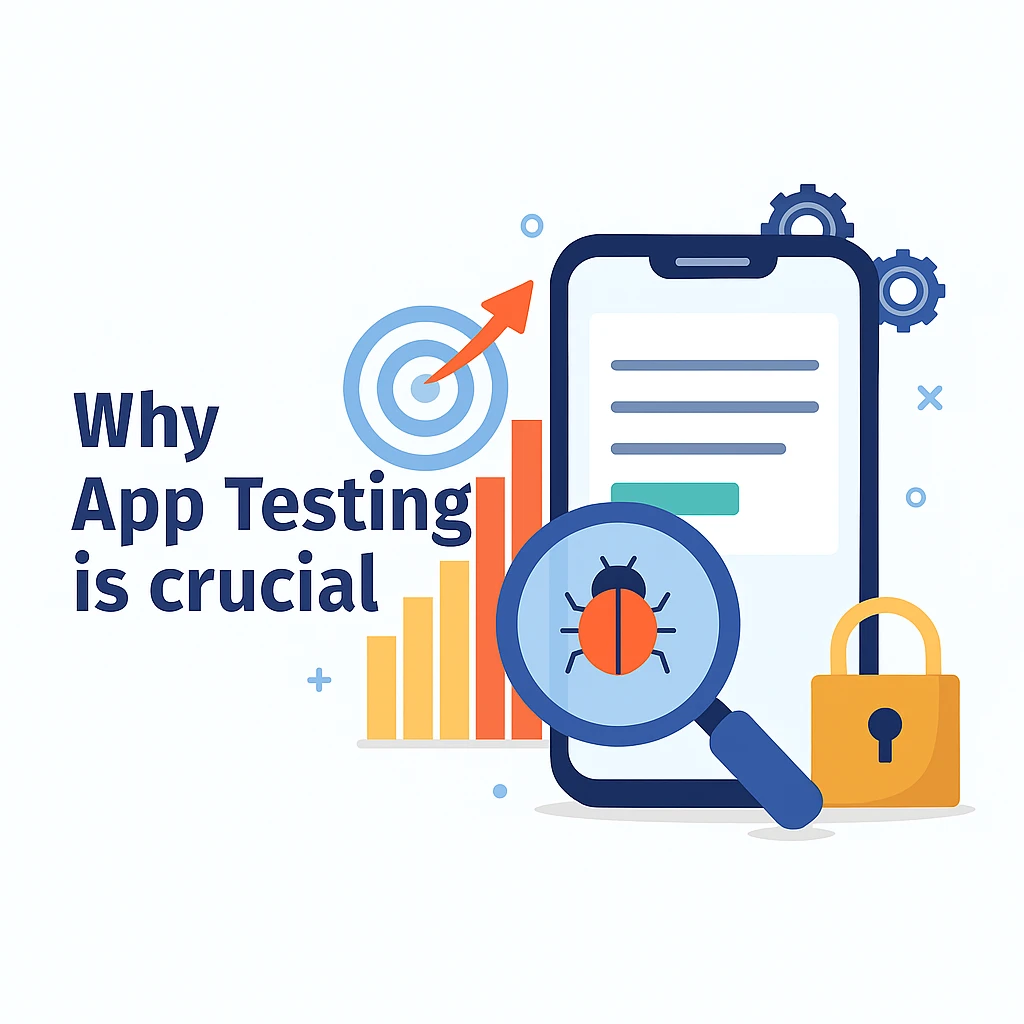Did you know that 48% of users would uninstall an app within the first usage experience in case of a crash or a freeze? Nowadays, nobody has time or even space to waste on anything in the app market, where millions of applications are offered at the Google Play Store and the Apple App store. A successful mobile app launch depends not just on smart features or creative design but also on reliability. This is where app testing becomes vital. Even a most innovative concept can be obscured in case it is not tested properly and bugs are eating the mobile app, performance is low and the users are frustrated.
App testing acts as the safety net in the app development process, ensuring smooth functionality, robust performance, and higher user retention. It forms the basis of quality assurance of mobile apps and is vital component of an effective mobile app launch plan. In the sections below, we will examine why testing is paramount, the various techniques that are used, what to avoid and what to follow to ensure your application will speak volumes when it hits the shelves.
What Is App Testing & Its Role in Development
App testing or mobile application testing is the process of evaluating a mobile app across different devices, operating systems, and conditions to ensure it works as intended. It is the foundation of mobile application QA and a vital gatekeeper of the app development life cycle, starting with design, and ending with deployment.
Testing will address not only the technical functionality but also the user experience by means of the instrumentation with the utilities such as TestFlight, Appium, Selenium, Android SDK, and iOS simulator. It entails pre-launch testing, vetting of the quality of the app and testing the phone performance to clear out errors prior to delivering the app to the end-users.
Mobile developers and QA engineers work in an agile context, where testing is a part of each sprint, and where continuous integration and continuous delivery (CI/CD) processes are frequently used. This time and again method means that bugs are detected promptly to save time and resource later. By validating usability, performance, and security, app testing secures a product’s success and prepares it for the competitive app store environment.
Why App Testing Is Crucial Before Launch
The importance of app testing cannot be overstated. Every successful app has one thing in common: thorough testing before release. The benefits of app testing span across performance, reputation, and financial impact.
- Prevents crashes and bugs: Testing identifies and fixes problems that cause apps to freeze or crash, ensuring stability at launch.
- Optimizes user experience: Smooth navigation and responsiveness keep users engaged and satisfied.
- Improves app store ratings: Positive reviews directly affect visibility in rankings. Apps with fewer bugs are more discoverable.
- Strengthens security and trust: Testing uncovers vulnerabilities, safeguarding user data.
On the other hand, skipping testing leads to poor retention rates, negative app store ratings, and wasted marketing investments. Reports show that apps with higher crash-free session percentages see stronger adoption and engagement. Testing, which combined with crash analytics and beta testing programs, ensures your app enters the market with confidence.
Types of Mobile App Testing You Must Perform
Different mobile app testing types address different aspects of an application. Together, they form a comprehensive mobile app QA testing strategy. Here are the must-do checks:
- Functional Testing – Ensures that all features work correctly, from login flows to payment systems.
- Usability Testing – Examines how intuitive and enjoyable the app is to navigate, ensuring user satisfaction.
- Performance Testing – Tests app speed, response time, and resilience under heavy traffic.
- Security Testing – Identifies vulnerabilities, preventing data theft, hacking, and privacy breaches.
- Compatibility Testing – Confirms app performance across multiple devices, screen sizes, and operating systems.
- Localization Testing – Verifies language, currency, and cultural settings for global users.
QA teams often rely on device testing labs, network simulation tools, the Android SDK, and the iOS simulator to achieve accurate results. Skipping any of these could lead to usability issues or reputation loss. A balanced checklist covering these mobile app testing types ensures the app is market-ready.
Common Mistakes in App Testing That Lead to Launch Failures
Rushing or neglecting testing can result in costly app launch failures. Here are the most common app testing mistakes:
- Testing on limited devices: Ignoring device diversity leaves gaps in performance.
- Cutting short timelines: Tight deadlines often reduce testing duration, leaving undetected bugs.
- Skipping security checks: Overlooking security tests can expose users to breaches.
- Ignoring beta feedback: User input during testing highlights real-world issues that should never be dismissed.
QA teams, beta testers, and crash report tools all play critical roles. Ignoring them can damage reputation and cause financial setbacks that outweigh the effort saved by rushing.
Best Practices for Effective App Testing
To avoid failures, we need to be aware of following mobile app testing best practices is essential. Some proven app QA best practices include:
- Test early and often: Adopting shift-left testing ensures issues are detected before they escalate.
- Combine automated and manual testing: Automation speeds up repetitive checks, while manual testing captures usability insights.
- Use real devices: Simulators are helpful, but real devices give accurate performance data.
- Maintain a bug tracking system: Tools like Jira, Trello, TestRail, or GitHub ensure transparency and accountability.
- Continue post-launch testing: Monitoring apps after release allows for quick fixes and performance improvements.
QA teams often integrate these practices with CI/CD pipelines using Jenkins or similar systems, streamlining the entire process.
Mini Case Study: Successful App Launch via Proper Testing
Consider a mobile startup that invested heavily in a pre-launch testing strategy. Their QA team focused on functional, security, and performance checks, supported by real-device testing. As a result, the app achieved a 99.9% crash-free sessions metric and secured thousands of five-star reviews within its first month.
This app launch case study demonstrates how rigorous testing directly improves retention and user satisfaction. With proper preparation, the app avoided negative reviews and quickly gained traction in the app stores. Such app QA success highlights the payoff of thorough testing during app launch preparation.
Conclusion
The journey from idea to launch is incomplete without app testing services. It is the key to avoiding bugs, protecting users, and ensuring a flawless mobile app launch. For businesses seeking a trusted partner, Emedia Infosoft stands out as the best app development company in Gwalior, backed by a team of mobile app development experts and professional app QA specialists.
At Emedia Infosoft, we blend innovation with rigorous custom app development and testing to ensure your app is launch-ready. As one of the top App development company in Gwalior, we guarantee that your app not only functions smoothly but also earns user trust from day one.



